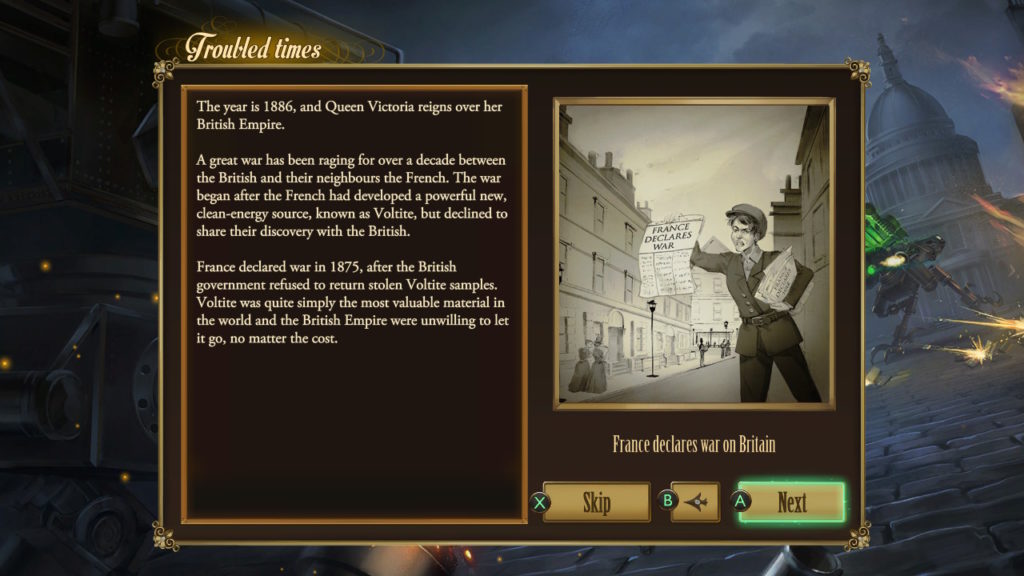Ironcast – Nintendo Switch
 Platform: Nintendo Switch
Platform: Nintendo Switch
Developer: Dreadbit Games
Publisher: Ripstone Ltd.
Release Date: August 10, 2017
Genre: Puzzle, Roguelike, Turn-based Strategy
Nerd Rating: 8.5 out of 10!
Looking at Ironcast, you will find a match-three and probably pass it off as a “mobile phone game”, however, it is so much more. The game is far more complex than I imagined, and seems to be very much inspired by FTL: Faster Than Light. I want to extend a quick thank you to the people over at Ripstone Ltd who were kind enough to supply me with a review copy, and as always, it does not affect my opinion on the game.
Starting with the story, Ironcast takes place in a 19th century Steampunk alternate history where the British and the French are in a fully mechanized war regarding the energy that was used to create said mechs. While aspects of the story are written quite well, it ultimately takes a back seat to the game mechanics, as the game is meant to be replayed many times. You play as one of many unlockable mech drivers (each with their own personality, history, abilities and specialties) and can use one of many unlockable mechs (also with their own abilities and specialties). You unlock these mechs and characters with commendation marks, which are rewarded to you at the end of each run.
Every day (in-game), you have the choice to do one of three story missions, which range in difficulty and focus. While many of the missions will have you destroying enemies, there are also some that will you have you trying to stay intact against an onslaught as enemies, as well as ones where your primary focus is to collect certain tiles. The missions reward you with XP, scrap, and war asset. The more war asset you have when you get to the boss fight, the less health the boss will start with. Scrap, on the other hand, can be used to upgrade your mech with different weapons, shields, engines, as well as repair your mech after each battle and buy other miscellaneous upgrades. When you level up in the game, you also get rewarded with a new passive ability. The simple, yet stunning artstyle of Ironcast helps to build the world around you while you are playing.
Ironcast is a permadeath turn-based strategy roguelike game that uses match-three mechanics to determine what moves you can make during your turn. Each round, there are four systems you can charge (weapons, energy, which is used for shields and movement, coolant, and repair), and in order to charge these systems, you must match the required tiles on the board. There are also special tiles on the board that will either boost the system you decide to use, or allow you to link tiles for multiple different systems in one match. You can make two matches per turn, and there is no limit to how many tiles can be in one match (with the exception of the bare minimum being two tiles). That being said, the systems themselves have limits, and matching too many would be pointless.
This system adds a certain amount of skill and knowing when to use what, but also adds some luck in the game. This system also adds quite a bit of learning, as during my first playthrough, I was playing completely wrong.
When it comes to combat, you have two weapons (which can be replaced as you progress). Generally stating, one of your weapons will do more damage throughout multiple shots, and one will be one big burst shot that can breach enemy shields. Much like the game FTL: Faster Than Light, you are able to choose what enemy systems you would like to target and attempt to disable. This is an essential aspect of the game as you will generally need to disable the enemy’s shield before being able to land shots on them with your other weapon. Defensively, you have shields and drive, which are both powered by energy tiles. Shields do what you would expect, and drive makes your mech start moving, thus allowing you to evade some attacks. When you use the shields or drives, it costs “coolant”. If you do not collect coolant when you need it, your mech will overheat and catch on fire.
Ultimately, Ironcast is the most interesting and engaging match-three game I have ever played. The game reminds me of FTL: Faster Than Light to a great extent while also maintaining its own charm, and that is in no way a bad thing. I can see this game taking up loads of my time on the Switch. While Ironcast is also available on Steam, I don’t feel as though there is much competition when it comes to which platform it should be bought for.
On the Nintendo Switch, the portability is a huge plus for this game, but the game can also be played entirely using the Switch touch screen, should you want to. If you enjoy match-three games, I highly recommend this game. I also highly recommend this game to you if you like strategy games, if you like FTL: Faster Than Light, or if you have any interest in steampunk. Now, if you’ll excuse me, I must go pray to the RNG gods.
Share This Post









Recent Comments